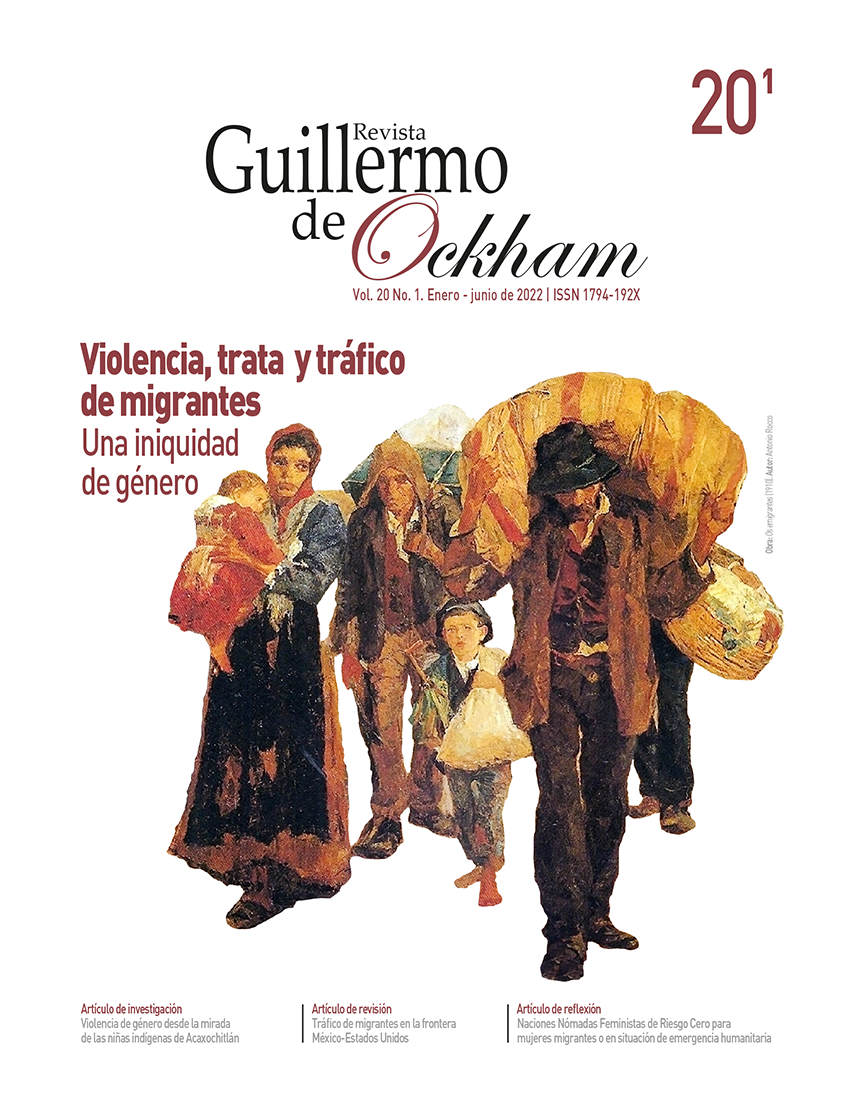The Revista Guillermo de Ockham provides an immediate and open access to its content, based on the principle of offering the public a free access to investigations to provide a global interchange of knowledge.
Unless otherwise established, the contents of this journal has a license with Creative Commons Attribution-NonCommercial-NoDerivatives 4.0 International (CC BY-NC-ND 4.0) http://creativecommons.org/licenses/by-nc-nd/4.0/
- Attribution: You must give appropriate credit, provide a link to the license, and indicate if changes were made. You may do so in any reasonable manner, but not in any way that suggests the licensor endorses you or your use.
- NonCommercial: You may not use the material for commercial purposes.
- NoDerivatives: If you remix, transform, or build upon the material, you may not distribute the modified material.
- No additional restrictions: You may not apply legal terms or technological measures that legally restrict others from doing anything the license permits.
Abstract
Referring to undocumented migration in northern Mexico is to talk about violence. Every year, thousands of people migrate irregularly, starting their journey from the south to the north on a train (The Beast) and risking their lives in search of better opportunities that their places of origin cannot offer them. It is in this journey that migrants must face a series of problems, dangers, abuses, and violence that expose a palpable but politically silenced reality. The objective of this work is to identify, through drawings, the most significant elements of the experience of undocumented migrants in northern Mexico and their relationship with the violence experienced. Therefore, this article addresses the concepts of undocumented migration and violence from the theoretical discussion, contrasting them with the experience of the migrants themselves and their drawings. The research was carried out in three cities in northern Mexico and included the participation of 39 undocumented migrants, who drew what they perceive for migration based on their experiences. The drawings showed that transit through Mexico is marked by different forms of abuse, violence, and human rights violations, establishing a social paradox where the good ones are the "bad ones" and the bad ones are the "good ones."
References
Alonso-Meneses, G. (2013). El desierto de los sueños rotos. Detenciones y muertes de migrantes en la frontera México-Estados Unidos 1993-2013. México: El Colegio de la Frontera Norte.
Aguilar, N. (2014). El proceso mental del dibujo: la observación de los esquemas. En L. Báez y E. Carreón (Eds.), XXXVI Coloquio Internacional de Historia del Arte. Los estatutos de la imagen, creación-manifestación-percepción, pp. 97-117. México: Universidad Nacional Autónoma de México, Instituto de Investigaciones Estéticas.
Camhaji, E. (2019). “Uno de cada tres migrantes sufre violencia a su paso por México”. El País [online]. Publicado el 21 de agosto de 2019. Disponible en https://elpais.com/internacional/2019/08/21/mexico/1566355676_007914.html
Carrasco, G. (2013). La migración centroamericana en su tránsito por México hacia los Estados Unidos. Alegatos, 83, 169-194. Disponible en http://alegatos.azc.uam.mx/index.php/ra/article/view/187/169
Castles, S. (2010). Migración irregular: causas, tipos y dimensiones regionales. Migración y desarrollo, 8(15), 49-80. Disponible en https://www.redalyc.org/articulo.oa?id=66019856002
Cortés, A. (2018). Violencia de género y frontera: migrantes centroamericanas en México hacia los EEUU. European Review of Latin American and Caribbean Studies, 105, 39-60.
De Alba, M. (2010). La imagen como método en la construcción de significados sociales. Iztapalapa, Revista de Ciencias Sociales y Humanidades, 69(2), 41-65. Disponible en https://revistaiztapalapa.izt.uam.mx/index.php/izt/article/view/242
Galtung, J. (2016). La violencia: cultural, estructural y directa [capítulo V]. En Cuadernos de Estrategia 183. Política y violencia: comprensión teórica y desarrollo en la acción colectiva [libro electrónico], pp. 147-168. Instituto Español de Estudios Estratégicos. España: Ministerio de Defensa.
Gómez-Johnson, C. (2015). De la migración económica a la migración forzada por el incremento de la violencia en El Salvador y México. Estudios Políticos, 47, 199-220. Disponible en http://www.scielo.org.co/pdf/espo/n47/n47a12.pdf
Gzesh, S. (2008). Una redefinición de la migración forzosa con base en los derechos humanos. Migración y Desarrollo, 10, 97-126. Disponible en http://www.scielo.org.mx/pdf/myd/n10/n10a5.pdf
Inclán, D. (2018). Violentamente visual. Los límites de la representación de la violencia. Interpretatio. Revista de hermenéutica, 3(2), 141-157. Disponible en https://revistas-filologicas.unam.mx/interpretatio/index.php/in/article/view/107
Jiménez-Yañez, C. (2021). "American dream". Migración indocumentada en el norte de México a través del dibujo. En M. Bermúdez (Coord.), Luces en el camino: filosofía y ciencias sociales en tiempos de desconcierto, pp. 1813-1837. España: Dykinson. Disponible en https://dialnet.unirioja.es/servlet/articulo?codigo=7868770
Jiménez-Yanez, C y Martínez-Soto, Y. (2011). Visiones y Representaciones de Estudiantes a Través del Dibujo. Revista Mexicana de Orientación Educativa, 8(21), 24-31. Disponible en http://pepsic.bvsalud.org/pdf/remo/v8n21/a04.pdf
Jiménez-Yañez, C. y Mancinas-Chávez, R. (2009). Semiótica del dibujo infantil: una aproximación Latinoamericana sobre la influencia de la televisión en los niños: Casos de estudios en ciudades de Chile, El Salvador y México. Arte, Individuo y Sociedad, 21, 151-164. Disponible en https://revistas.ucm.es/index.php/ARIS/article/view/6608
Osorio, E. (2014). La bestia: muerte y violencia hacia migrantes en tránsito por México. Tesis de Maestría en Comunicación. Universidad Iberoamericana Ciudad de México. Disponible en http://www.bib.uia.mx/tesis/pdf/015852/015852s.pdf
París-Pombo, M. (2016). Trayectos peligrosos: inseguridad y movilidad humana en México. Papeles de Población, 22(90). http://dx.doi.org /10.22185/24487147.2016.90.037
París-Pombo, M.; Ley, M. y Peña, J. (2016). Migrantes en México, vulnerabilidad y riesgos. Un estudio teórico para el Programa de Fortalecimiento Institucional “Reducir la vulnerabilidad de migrantes en emergencias”. México: Organización Internacional para las Migraciones (OIM) y El Colegio de la Frontera Norte. Disponible en https://mexico.iom.int/publicaciones?page=2
Prado, R. (2017). La pesadilla de una travesía: Las violencias que acompañan a menores migrantes del Triángulo Norte hacia México. Revista Chilena de Relaciones Internacionales, 1(1), 127-148. Disponible en http://rchri.cl/wp-content/uploads/2017/03/7.pdf
Martínez, O. (2010). Los migrantes que no importan: en el camino con los centroamericanos indocumentados en México. Barcelona: Icaria Editorial.
Martínez-Soto, Y.; Jiménez-Yañez, C. y Rosas-Martínez, P. (2020). Discurso y representaciones sobre la violencia. Un análisis a través del dibujo. Opción: Revista de Ciencias Humanas y Sociales, 36(93), 346-358. Disponible en https://produccioncientificaluz.org/index.php/opcion/article/view/32743
Nájera, J. (2016). El complejo estudio de la actual migración en tránsito por México: Actores, temáticas y circunstancias. Migraciones Internacionales, 8(3), 255-266. Disponible en http://www.scielo.org.mx/pdf/migra/v8n3/1665-8906-migra-8-03-00255.pdf
Zavaleta, J. (2018). Elementos para la construcción del concepto de campo de la violencia. Sociológica, 33(93), 151-179.
Žižek, S. (2009). Violence: Six Sideways Reflections. Estados Unidos: Profile Books.

































